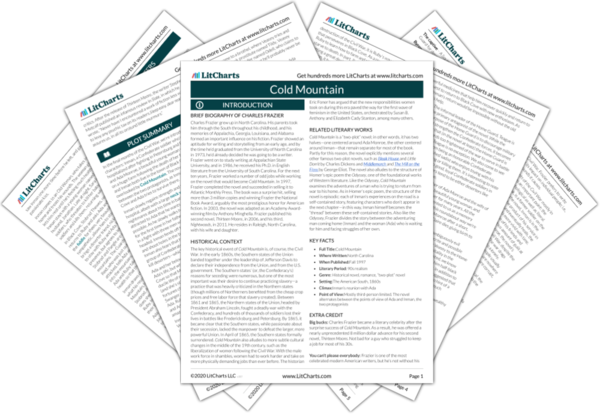The informal leader of the Home Guard, Teague is arguably the primary antagonist of the novel. While the supposed purpose of the Home Guard is to discourage military deserters and strengthen the Confederate forces, it becomes clear over time that (in the novel at least) the Home Guard is made up of cowards too frightened of the war to serve in battle themselves—and Teague is no exception. We also come to see that Teague—far from being an honorable Confederate soldier—is an unabashed sadist who enjoys toying with his victims before arresting or killing them. It’s interesting to note that there are almost no good, loyal Confederate soldiers in Cold Mountain: the soldiers tend to be either deserters like Inman or bullies like Teague.
Teague Quotes in Cold Mountain
The Cold Mountain quotes below are all either spoken by Teague or refer to Teague. For each quote, you can also see the other characters and themes related to it (each theme is indicated by its own dot and icon, like this one:
).
Chapter 2
Quotes
Teague and his Home Guard roaring around like a band of marauders. Setting their own laws as suits them, and them nothing but trash looking for a way to stay out of the army.
Related Characters:
Page Number and Citation:
Explanation and Analysis:
Get the entire Cold Mountain LitChart as a printable PDF.

Teague Quotes in Cold Mountain
The Cold Mountain quotes below are all either spoken by Teague or refer to Teague. For each quote, you can also see the other characters and themes related to it (each theme is indicated by its own dot and icon, like this one:
).
Chapter 2
Quotes
Teague and his Home Guard roaring around like a band of marauders. Setting their own laws as suits them, and them nothing but trash looking for a way to stay out of the army.
Related Characters:
Page Number and Citation:
Explanation and Analysis:














